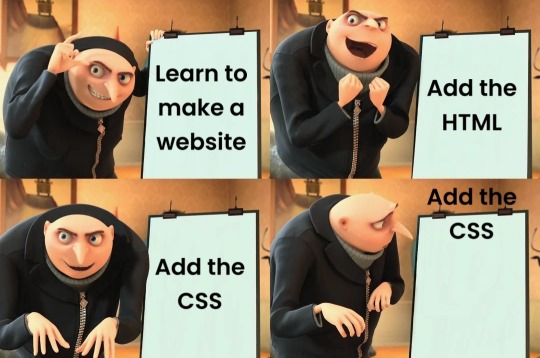#web development technologies
Explore tagged Tumblr posts
Text
Static vs Dynamic Websites: What Every Developer Needs to Know

When embarking on a journey in web development, it's essential to understand the fundamental differences between static and dynamic websites. As a developer, these two types of websites form the core of your skill set, and knowing their strengths and limitations will help you create better, more efficient websites. If you're looking to kickstart your journey, taking web development classes in Yamuna Vihar can give you the foundational knowledge needed to grasp these concepts thoroughly.
What Are Static Websites?
A static website is one where the content remains the same every time a user visits. These websites are often built using simple HTML and CSS, offering a straightforward way of presenting information. Static websites are ideal for small-scale projects like personal portfolios, blogs, or small business websites, where the content does not need to change frequently. Since static sites deliver the same content to all users, they are often faster and more secure compared to their dynamic counterparts.
One of the key advantages of static websites is their simplicity. They are easy to build, and the server doesn't need to do much processing, resulting in quicker load times. These websites are also less prone to security threats because they don’t rely on databases or server-side scripting languages. For businesses or individuals looking for a basic online presence, static websites can be an excellent and cost-effective solution.
However, static websites have limitations. Because the content is fixed, any change or update requires manual intervention by the developer. This makes static sites less suitable for websites that require frequent content changes or user interaction, such as e-commerce platforms or social networks.
What Are Dynamic Websites?
In contrast, dynamic websites are built using more complex technologies that allow content to change based on user interaction or other variables. These websites typically rely on server-side languages such as PHP, Python, or JavaScript frameworks like Node.js. They also often use databases to store and retrieve content, making them ideal for websites that need to present unique information to each visitor, like user profiles, blogs, or e-commerce sites.
Dynamic websites offer a much higher degree of flexibility and scalability than static websites. They allow for real-time content updates, user-generated data, and advanced features like search functions, interactive forms, and content management systems (CMS). These websites are essential for businesses that need to manage large volumes of content or offer personalized experiences for their users.
The trade-off, however, is that dynamic websites are generally more complex to develop and maintain. They require a server capable of processing scripts, accessing databases, and delivering dynamic content to the user. While the flexibility and interactivity they provide are significant advantages, they also come with the added responsibility of ensuring smooth server-side processing, security, and regular updates.
Key Differences Between Static and Dynamic Websites
Content Updates: Static websites require manual updates to change content, whereas dynamic websites automatically update content based on user interaction or data changes.
Technology Stack: Static sites rely on HTML, CSS, and simple JavaScript, while dynamic sites require server-side scripting languages, databases, and more advanced technologies.
Interactivity: Static websites offer minimal interaction, mainly focused on presentation. Dynamic websites, on the other hand, offer extensive interactivity through user input, databases, and real-time data.
Performance and Scalability: Static websites generally perform better and are faster because they don’t require server-side processing. Dynamic websites, due to their reliance on databases and server-side scripts, may experience slower load times, especially as they scale.
Cost: Static websites are generally less expensive to develop and host, while dynamic websites, due to their complexity and reliance on databases, can be costlier in both development and maintenance.
Which One Should You Choose?
The decision between a static or dynamic website largely depends on the specific needs of the project you're working on. If you are creating a website for a small business, personal portfolio, or informational page, a static site is an excellent option. It's quick to develop, easier to maintain, and cost-effective.
However, if you're working on a larger project that requires user interaction, real-time updates, or a content management system, a dynamic website is the better choice. For instance, e-commerce websites, social media platforms, and interactive web applications are typically dynamic websites.
For those looking to advance their careers as web developers, it’s crucial to have a solid understanding of both types of websites. Gaining this knowledge will not only make you a more versatile developer but will also open doors to more advanced projects. Enrolling in web development coaching institutes in Uttam Nagar can offer you hands-on experience and in-depth knowledge of both static and dynamic web technologies, preparing you for a successful career in this ever-evolving field.
Conclusion
Whether you're just starting or looking to enhance your web development skills, understanding the difference between static and dynamic websites is crucial. Static websites are simple, fast, and secure but are limited in terms of interactivity and content management. Dynamic websites, while more complex, offer greater flexibility, scalability, and interactivity, making them suitable for more advanced projects. By mastering both types of websites, you’ll be well-equipped to take on a variety of web development projects, from basic informational sites to complex, interactive web applications. For those looking to expand their skills further, joining a web development coaching institute in Uttam Nagar can provide the resources and expertise necessary to excel in the industry.
By considering the specific needs of your project and the trade-offs of each approach, you’ll be able to make an informed decision and create a website that not only meets but exceeds expectations.
Suggested Links
Web development course
Web Development Training
web development classes
#web development course#web developers#web design trends#web development technologies#web Development training institute#web Development course in Yamuna Vihar#web Development Tips#web development skills
0 notes
Text
Choosing the Right Technology Stack for Your Web App
Explore essential tips for selecting the best technology stack for web apps. Learn about key web development technologies and the differences between front end and back end technologies to make informed decisions.
#Technology Stack for Web Apps#Web Development Technologies#Best Tech Stack#Choosing a Tech Stack#Frontend vs. Backend Technologies#Web App Development Tools
1 note
·
View note
Text
Leading Web Development Companies In Los Angeles

In the world of web development, Los Angeles is a leading web development service provider with Creativity, efficiency, and the ability to solve complex problems. Selecting the Best Web development company from Los Angeles is very challenging so here we are going to explore Los Angeles’s Top web Development Companies like eSparkbiz and SEROKELL.
0 notes
Text
Tech Trends: Exploring the Leading Web Development Technologies

In the rapidly evolving landscape of web development, staying up-to-date with the latest technologies is essential for developers and businesses alike. As technology continues to advance, new tools, frameworks, and libraries emerge, offering innovative solutions and opportunities for building modern web applications. In this article, we'll delve into the leading web development technologies that are shaping the future of web development, exploring their features, benefits, and potential applications in today's digital landscape.
1. React.js:
React.js continues to be a dominant force in the world of web development, known for its component-based architecture and efficient rendering capabilities. Developed by Facebook, React.js simplifies the process of building interactive user interfaces by breaking down complex UIs into reusable components. Its virtual DOM implementation ensures optimal performance and seamless updates, making it ideal for building dynamic single-page applications (SPAs) and progressive web apps (PWAs). With a vast ecosystem of libraries, tools, and community support, React.js remains a top choice for developers seeking to build modern and scalable web applications.
2. Vue.js:
Vue.js has rapidly gained popularity among developers due to its simplicity, versatility, and progressive adoption curve. With its intuitive syntax and lightweight nature, Vue.js offers a highly approachable framework for building interactive web interfaces. Its reactive data binding and component-based architecture enable developers to create modular and scalable applications with ease. Vue.js is particularly well-suited for rapid prototyping, small to medium-sized projects, and integrating with existing web applications. As Vue.js continues to mature and expand its ecosystem, it remains a formidable contender in the web development landscape.
3. Angular:
Angular, developed and maintained by Google, is a robust framework for building complex and feature-rich web applications. Angular's comprehensive feature set, including two-way data binding, dependency injection, and TypeScript support, makes it a powerful choice for enterprise-scale projects. With its strong ecosystem, extensive documentation, and built-in tooling, Angular provides developers with everything they need to develop scalable and maintainable applications. Despite its steep learning curve, Angular's stability, performance, and support for large-scale applications make it a preferred choice for businesses seeking enterprise-grade solutions.
4. Next.js:
Next.js has gained significant traction as a leading framework for server-side rendering (SSR) and static site generation (SSG) in React applications. Next.js simplifies the process of building performant and SEO-friendly web applications by enabling developers to pre-render pages at build time or on the server. Its built-in support for routing, code splitting, and automatic optimization streamlines the development workflow and enhances the user experience. Next.js is particularly well-suited for building content-heavy websites, e-commerce platforms, and blogs, offering developers a powerful toolkit for building modern web applications with ease.
5. GraphQL:
GraphQL has emerged as a game-changer in the world of web development, offering a more efficient and flexible alternative to traditional REST APIs. Developed by Facebook, GraphQL enables clients to request precisely the data they need, minimizing over-fetching and under-fetching of data. Its type system and introspection capabilities empower developers to define clear schemas and explore data relationships effectively. GraphQL's popularity continues to grow, driven by its ability to streamline data fetching and enable seamless integration with various frontend frameworks and backends.
Conclusion:
As we explore the leading web development technologies, it's clear that the landscape is rich with choices for developers seeking to build modern, scalable, and performant web applications. Whether you opt for React.js, Vue.js, Angular, Next.js, GraphQL, or a combination of these technologies, the key is to select the right tools and frameworks that align with your project requirements, team expertise, and long-term goals. By staying abreast of the latest trends and advancements in web development, developers can leverage the power of these technologies to create exceptional web experiences that delight users and drive business success in the digital age.
0 notes
Text
A Sneak Peek into the Top Cloud-Based Web Development Technologies!
Cloud computing programming comes in many varieties. For example, back-end developers can be tasked with creating cloud-native software or ensuring the continuous delivery of a linked network of microservices. For admins, this may imply writing a script that automatically provisions cloud-based resources. So, let's get started with the best cloud-based web development technologies to know and the hot trends in cloud web development in 2023!
0 notes
Text
I think the real reason most websites are janky as hell to use these days is because web developers have become so specialised that nobody really understands how anything works anymore. The other day I had to explain why hosting critical Javascript libraries on a third-party CDN is a bad idea to a "lead developer" who genuinely didn't know the difference between server-side versus client-side scripting.
2K notes
·
View notes
Text

#programmer humor#programming#geek#nerd#programmer#technology#computer#phone#mac#windows#os#operating system#website#web development#dev#developer#development#full stack developer#frontend#backend#software#hardware#html#css#meme#despicable me#gru#joke#software engineer#apple
423 notes
·
View notes
Text


Pushed myself to go outside and do something different today, so I ran some errands and visited a new bookshop (didn't buy anything, and it was alright, too commercial/trendy for my taste idk). Read the whole bus ride, and I'm loving this book 🌻
Otherwise I've been working on my app, I updated my CV and linkedin, I've watched all available episodes of severance (so many unanswered questions I love it), and mostly I've been resting <3
+ some feelings of inadequacy and loneliness, but ah well, it's expected when I have more time to think.
#uni#life#studyblr#study#academia#codeblr#information technologies#coding#books#bookblr#studyspo#web development#web dev#reading
133 notes
·
View notes
Text
WHY YOU SHOULD CHOOSE INFORMATION TECHNOLOGY (IT)?
Semillano, Prince Q. | BSIT1A
50 notes
·
View notes
Text
i need more mutuals who are into coding and engineering!! more info under the cut!!
I planned to become an electrical engineer like my stepdad but then I decided to change my path to programming. I'm currently studying at technikum (<- wikipedia link so I don't have to explain the whole polish learning system), programmer major.
this year I have exams from web development (10th Jan - theory, 16th Jan - practical exams) and next year I have exams from App development (both mobile and desktop).
I know C family languages, Java, Python and those ones I am currently using. I also know a bit of Kotlin and I think I will continue learning it.
For web dev I know HTML and CSS ofc but also PHP and JS.
Planning on learning more languages I can use for App and operating system development as well as just to know them cause I want to after this year's exams!
my learning list:
Lua (I heard it's easy but I can't really get myself to read anything about this atm idk why)
Ruby
Assembly
Rust
As for electrical engineering I don't know much tbh but I would like to learn! I just used CAD programs for technical drawings (dad taught me some basic things when I was still thinking about going his path) helped my dad fix things on his Solar farm, houses of our neighbors and I made a few very simple circuits for fun a few years ago. Now I'm mostly focused on programming but since I learned most of the things I need for exams I have more time to do whatever I want now!
I'd like to get to know more people so I can share and mostly learn new things since even though I'm coding for years I consider myself a beginner and I am a total beginner when it comes to electrical engineering.
I'm willing to be friends or at least mutuals with anyone who codes or makes websites or is in STEM! no matter what your specialty/interest is exactly and no matter if you are a total beginner or a professional ^__^
I'd also like to have some mutuals who are into old web development and retro computing!!!!!!!!
edit: I forgot but I'm also interested in physics and quantum physics
#dear.diary୨୧#stemblr#women in stem#stem#programming#coding#web development#web design#old web#retrocomputing#computing#engineering#technology#techindustry#computers#computer#templeos#terry a davis#terry davis#linux#open source#github#calculus#physics#quantum physics#mathblr#mathematics
36 notes
·
View notes
Text
C# Study Links | Resources ✨

As I am starting to relearn C#, I thought why not share some links that have helped me in the past and what new ones I will be using this time to learn! I already made a similar resource post (post 1 | post 2) for C# in the past but why not a new one? 🤗

Microsoft Learn - LINK
C# Station - LINK
YouTube - LINK
SoloLearn - LINK
Codecademy - LINK
Learn C# - LINK
C# Yellow Book - LINK
C# Programming Guide - LINK
Tutorials Point - LINK
Roadmap to ASP.NET Core Developer (C#): LINK
C# Subreddit - LINK
Dot Net Perls - LINK
C# Coding Conventions - LINK
The Ultimate C# Guide For Beginners - LINK

That's all for now! If this does interests you, do check out the other posts (1 | 2) I made of other C# resources!
Happy coding/programming! 😎💻👍🏾

#resources#coding resources#programming#coding#studying#codeblr#progblr#web development#webdev#computer science#cs academia#study hard#technology#tech#csharp#dotnet#software development#software
825 notes
·
View notes
Photo

What is an Algorithm in 30 Seconds?
An algorithm is simply a series of instructions.
Think of a recipe: boil water, add pasta, wait, drain, eat. These are steps to follow.
In computer terms, an algorithm is a set of instructions for a computer to execute.
In machine learning, these instructions enable computers to learn from data, making machine learning algorithms unique and powerful.
#artificial intelligence#automation#machine learning#business#digital marketing#professional services#marketing#web design#web development#social media#tech#Technology
69 notes
·
View notes
Text
Latest top Web Development technologies trending in 2023-2024

Nowadays Web Development technologies growing very fast to stay ahead in Web Development explore the top technologies and innovations in 2024 to increase productivity and improve user experience In addition to enhancing security. For mor details: https://www.businessandlifetips.com/2023/06/15/top-web-development-technologies-in-spotlight-in-2023-2024/
0 notes
Text

Wed, July 31st, 2024
It's been a bit but a lot has happened recently. I passed the Network+ certification about two weeks ago. Since then, I've picked up my web development class again aiming to finish before I start a new job in a couple of weeks. I rediscovered? a cute coffee shop near my house to study at and I spent about two hours there today. The coffee was a 7/10. I nearly finished the 5th chapter of my online textbook. I'm ready to be done with this class.
52 notes
·
View notes
Text

im currently programming a website from scratch and decided to make myself a blinkie !! the image is pretty big so i had to size it down a lot for tumblr to accept it

this is how its actually supposed to look like dhfshd
#art#artwork#drawing#illustration#art commission#art style#artists on tumblr#commisionwork#commission#small artist#webcore#website#old web#web development#computer#windows#technology#tech#blinkies#page decor#old web graphics#web graphics#stamps#web resources#mlp fanart#mlp fim#mlp g4#mlp#mlp art#mlp oc
50 notes
·
View notes